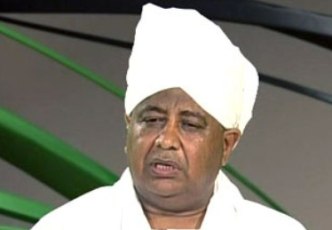NCP says reasons for change in Sudan are yet to materialise
July 1, 2012 (KHARTOUM) – Sudan’s ruling National Congress Party (NCP) has accused opposition forces of trying to ride the wave of protests against the government’s austerity measures in order to achieve a change whose “reasons are yet to materialise”.

He claimed however that if Sudanese people really wanted change, they would have done it already. According to Ghandour, reasons for change in Sudan are “yet to materialise” due to a lack of objectivity on the part of opposition groups.
He went on to criticise opposition forces, accusing them of dealing with the NCP on the basis of “either we’re in it [power] or we demolish it”. Gandour said that the NCP was hoping that the opposition would present an economic solution to solve the current crisis rather than mobilising people to take to the street and talking about how to divide power following regime fall.
NCP officials including President Omer Al-Bashir have been trying to downplay the scale of the protests that began on 16 June in response to the government’s partial ending of fuel subsidies, as part of an austerity package that officials say are needed to make up for a budget deficit of $2.4 billion US that they exclusively attribute to the loss of 75 percent of the country’s oil production due to South Sudan’s secession.
Opposition parties loosely allied under the umbrella of the National Consensus Forces (NCF) which includes the National Umma Party (NUP) of Al-Sadiq al-Mahdi and the Popular Congress Party (PCP) of Hassan Al-Turabi, were held back from throwing their full weight behind the protests due to their disagreements on how to administer the country after the NCP is toppled.
Meanwhile, youth opposition groups such as Girifna have been at the forefront of the protests which widened over the following two weeks with hundreds of demonstrators burning tires and chanting slogans denouncing price rise and calling for the downfall of the regime in various parts of the capital Khartoum and 10 regional towns.
Ghandour objected to opposition accusations that the NCP failed to achieve economic development. He added that some opposition leaders had previously described the NCP government as “Noah’s Ark” and almost joined the regime before they got cold feet. His statement is a veiled reference to the NUP leader Al-Sadiq al-Mahdi who in 2008 signed an agreement called the National Reconciliation Accord with the NCP.
Al-Mahdi is viewed with suspicion among opposition stalwarts due to the fact that he advocates dialogue with the NCP as opposed to confrontation which he warns could lead to the “Somalization” of the country.
Speaking on the same event, NUP’s leading member and daughter of Al-Sadiq Al-Mahdi, Mariam, denied allegations that her party is straddling the divide between the opposition and the NCP. “The last thing we need now is pointing fingers”, she stated.
Mariam said that the participation of her brother Abdel Rahman in the government as an assistant to President Bashir came in his personal capacity and has nothing to do with the NUP.
(ST)
